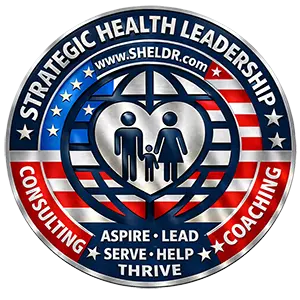Takeaways
- Strategic-level health and human services coaching helps leaders align their vision with organizational goals, promoting innovation and shared purpose.
- Coaching enhances teamwork, communication, and well-being in healthcare organizations beyond individual development.
- Exemplary healthcare leaders demonstrate coaching habits such as strategic vision, emotional intelligence, adaptive communication, continuous learning, and collaboration.
Table of Contents
Introduction
Achieving success in the dynamic field of healthcare leadership demands more than just administrative or clinical practice knowledge. It necessitates a strategic leadership approach that transcends conventional management approaches. Here’s where executive coaching comes into its own. This article will define coaching at the executive level, examine its advantages for health and human services providers and organizations, explain the differences between coaching and mentoring, and list the five strategic-level coaching practices that top health and human services executives exhibit.

We’ll demonstrate how coaching can be applied in various health and human services settings with real-world examples and insights and lay out clear guidelines for mid-career professionals aiming for strategic leadership roles in the health sector. As such, imagine the following scenarios:
- New Health and Human Services Initiative: In the face of implementing a new preventive health initiative, coaching can guide leaders to communicate effectively with team members, align everyone with the strategic vision, and address potential challenges collaboratively.
- Public Health Crisis: During a health crisis, coaching supports health and human services leaders in maintaining emotional resilience, adaptive communication, and strategic decision-making to lead their teams through the situation with empathy and effectiveness.
- Leading a Research Team: When leading a research team, coaching can help health and human services leaders foster a culture of continuous learning, encouraging team members to contribute innovative ideas, collaborate effectively, and adapt to the dynamic nature of health and human services research.
Definition of Coaching at the Executive Level
Executive health and human services coaching involves a strategic and individualized collaboration between a health and human services leader and a coach. In contrast to mentoring, which frequently entails sharing experiences and wisdom, executive coaching is centered on helping leaders realize their full potential via goal-setting, self-discovery, and ongoing development.
It’s a cooperative process designed to improve leadership abilities, encourage creativity, and accomplish organizational objectives. Executive coaches guide without imposing solutions while working closely with health and human services industry leaders to navigate complex challenges.
Benefits of Coaching
Coaching has several advantages for organizations and health and human services professionals:
- Coaching helps people acquire the leadership skills necessary to navigate the complex health and human services environment successfully. It gives leaders a secure environment to think things through, hone their decision-making skills, and build emotional intelligence.
- Coaching promotes a culture of cooperation and trust by improving teamwork and communication within health and human services institutions.
- It improves the general health of medical professionals by lowering burnout and raising job satisfaction.
Difference Between Coaching And Mentoring
Although both seek to promote professional development, coaching and mentoring take different approaches. As mentioned, coaching is a goal-oriented, goal-cooperative process aiming to maximize each person’s potential. It entails posing thought-provoking queries to encourage introspection and problem-solving.
Conversely, mentoring entails an experienced person providing guidance, insights, and advice to a less experienced person. In contrast to coaching, which promotes self-reliance, mentoring offers more specific advice based on the mentor’s experiences.
Explanation of the Habits of Coaching
- Alignment: Exhibiting a strategic vision that aligns with the organization’s mission and goals is one of the most essential characteristics of excellent health and human services leaders. They strive to accomplish two things: coaching their teams to see the bigger picture and cultivating a shared vision that guides decision-making and inspires innovation.
- Resilience: Leadership in the health and human services industry is characterized by a coaching mindset and high emotional intelligence. To foster a supportive and compassionate workplace atmosphere, they can overcome obstacles with resiliency and coach their teams to develop emotional intelligence.
- Communication: Good health and human services leaders are characterized by their ability to communicate effectively. To ensure that vital information is conveyed with clarity and empathy, they adapt their communication styles to the various scenarios they encounter and coach their teams to communicate adaptively.
- Learning and Improvement: Strategic-level leaders in the health and human services industry are dedicated to learning and improving continuously. To cultivate a culture that values curiosity, innovation, and a proactive approach to professional development, they assist their teams in adopting a growth mindset through coaching.
- Collaboration: The importance of collaboration is something exceptional leaders in the health and human services industry know. To foster partnerships that result in favorable outcomes for patients and the health and human services system, they provide their teams with coaching to help them develop strong interpersonal relationships within and outside the organization.
Important Considerations
When coaching health and human services leaders, resilience is a crucial factor to consider. Not only is resilience a trait unique to each person, but it is also a skill that can be developed through strategic coaching. Excellent leaders in the health and human services industry who have a coaching mindset prioritize developing resilience, not only in themselves but also in their teams. When applied to this scenario, a coach acts not only as a guide in making strategic decisions but also as a support system in navigating the challenges inherent in the leadership of health and human services organizations.
It is possible for leaders in the health and human services industry to cultivate the emotional intelligence necessary to recover from failures, keep their concentration during times of crisis, and create a work environment that is resilient through the process of coaching. Aspiring coaches can benefit from exploring strategies that build resilience and incorporating those strategies into their coaching practices to better support health and human services leaders on their journey to strategic positions.
Executive coaches are required to prioritize ongoing professional development, just as leaders in the health and human services industry strive for continuous improvement. As the landscape of health and human services leadership continues to change, the knowledge and abilities of coaches should also continue to evolve. For effective coaching, it is necessary to maintain awareness regarding the most recent developments in health and human services, leadership theories, and coaching methodologies.
Executive coaches can improve their skills by participating in advanced certification programs, attending workshops, and participating in coaching communities. These are all avenues that they can pursue. This commitment to continuous learning not only expands the toolkit available to the coach but also instills confidence in health and human services leaders who are looking for coaching services. As the health and human services industry continues to undergo transformative changes, executive coaches should take the initiative to keep themselves updated on these developments. This will ensure that their coaching continues to be impactful and relevant.
Ethical considerations are of the utmost importance. Executive leadership coaches in the health and human services industry play a significant part in determining the future course of both individuals and organizations in the health and human services industry. Coaches need to behave according to a set of ethical guidelines that put the health and happiness of the health and human services leader and the health and human services community as a whole at the forefront of their concerns. Given the prevalence of sensitive information in the health and human services industry, maintaining confidentiality, a fundamental component of ethical coaching takes on an even greater significance.
The coaches are responsible for walking the fine line between providing support and respecting the boundaries of their professional roles. Anyone interested in becoming an executive coach should become familiar with the ethical guidelines that have already been established, such as those that reputable coaching associations and health and human services regulatory bodies outline. A commitment to ethical conduct is necessary to ensure that coaching relationships are built on trust. This, in turn, contributes to the overall success and integrity of health and human services leadership coaching.
Expectations from an Executive Coach
Mid-career professionals aspiring to strategic health leadership positions should expect their executive coach to possess the following qualities:
- Expertise: A coach should deeply understand the health and human services industry, its challenges, and the intricacies of leadership at the strategic level.
- Active Listening and Questions: Coaches should excel in active listening, allowing them to understand the unique challenges of the health and human services leader. They must ask powerful questions that stimulate critical thinking and self-reflection.
- Customized Coaching: A good executive coach tailors their coaching methods to meet the specific needs, strengths, and aspirations of the health and human services leader, ensuring a personalized and impactful coaching experience.
- Trust: Trust is fundamental in coaching relationships. A coach creates a safe and supportive environment where health and human services leaders feel comfortable sharing their concerns, challenges, and aspirations.
- Feedback: A coach should provide constructive feedback and hold the health and human services leaders accountable for their goals, fostering a sense of ownership and responsibility for their professional development.
Deep Dive Questions
- Reflect on a challenging health and human services leadership scenario. How might adopting a coaching mindset have influenced your decision-making and the outcomes for your team?
- Consider a time when you received mentorship and another when you experienced coaching. How did the approaches differ, and which contributed more significantly to your leadership growth?
- How can health and human services leaders cultivate adaptive communication within their teams, and what role does coaching play in fostering this essential skill?
- In what ways can coaching contribute to the development of emotional intelligence among health and human services professionals, and how might this impact overall team dynamics?
- Reflect on a recent project within your health and human services organization. How could the strategic-level coaching habit of continuous learning and improvement have enhanced the project’s success?
Learning Activities for Aspiring Coaches
- Coaching Role-Play Session: Engage in a role-play session where aspiring coaches take turns playing the role of both coach and health and human services leader. This hands-on activity helps develop active listening, questioning, and feedback skills.
- Case Study Analysis: Analyze real-world case studies of successful health and human services leaders who attribute their success to coaching. Identify the specific coaching habits exhibited and discuss how they contributed to their achievements.
- Personal Development Plan: Aspiring coaches can create a personal development plan outlining how they will cultivate the five coaching habits within themselves. This plan can include specific actions, resources, and timelines for skill development.
Conclusion
In pursuing senior or strategic health leadership positions, mid-career professionals in preventive health, health and human services, public health, mental health, allied health, research, and social or human services sectors can benefit immensely from adopting the strategic-level coaching habits discussed in this article. Health and human services leaders can pave the way for personal and professional growth by understanding the unique role of coaching at the executive level, recognizing its benefits, distinguishing it from mentoring, and embodying the five essential coaching habits. Moreover, with the right expectations from an executive coach, mid-career professionals can navigate their journey to strategic health leadership positions with confidence, resilience, and a commitment to continuous improvement.
What now, Coach?
References
These references provide a starting point for further exploration of executive-level coaching and the strategic-level coaching habits discussed in the article. By digging deeper into these resources, aspiring strategic health leaders who want to build their coaching competencies can gain valuable knowledge and skills to support health and human services leaders in their journey to success.
- Executive Coaching for Health and Human Services Leaders: A Guide to Transforming Leadership and Organization by Cathy Taylor and Michael S. Taylor delves into the challenges and opportunities these leaders face and provides practical guidance on how coaching can help them navigate them.
- David L. Dotlich and Peter C. Noel’s book Developing Leaders: Leveraging the Power of Executive Coaching offers a thorough overview of executive coaching, its benefits, and relevant health and human services leadership methodologies.
- Jonathan Passmore and Ronald E. Barnes’ The Coaching Handbook: A Guide to Best Practices for Coaches, Managers, and HR Professionals provides practical tools and techniques for coaches, including strategies for coaching leaders in complex organizations like health and human services.
- The Five Levels of Leadership: Proven Strategies to Ignite a Leadership Revolution by John C. Maxwell provides insights into leadership development at various levels, which can be applied to coaching health and human services leaders pursuing strategic positions.
- Mindset: The New Psychology of Success by Carol Dweck emphasizes the significance of a growth mindset, one of the five strategic coaching habits discussed in the article. Aspiring coaches can learn about mindset science and how health and human services leaders can develop it.
- Travis Bradberry and Jean Greaves’ Emotional Intelligence 2.0 offers practical strategies for developing emotional intelligence, a crucial trait for successful health and human services leaders. These strategies can help coaches help leaders manage complex emotions and build strong team relationships.
- The Art of Adaptive Leadership: Leading in a Changing World by James M. Kouzes and Barry Z. Posner: This book emphasizes the importance of adaptability in leadership for health and human services leaders in a changing world. This book can help coaches coach leaders to adapt and be resilient.
- Lolly Daskal’s The Leadership Gap: What Gets Between You and Your Greatness: This book addresses leadership challenges and provides strategies for success. They understand these challenges and how coaching can help leaders and aspiring coaches.
- The Coaching Habit: Say Less, Ask More, and Transform Your Leadership by Michael Bungay Stanier: The coaching framework in this book is simple and effective for health and human services leaders. This framework can help aspiring coaches practice.
- Health and Human Services Leadership Institute: https://humanservicesleadership.org/ – Provides excellent leadership resources, including articles, webinars, and courses. These resources can help aspiring coaches understand the health and human services landscape and leaders’ needs.
- The Center for Creative Leadership: https://www.ccl.org/ – Offers resources on executive coaching, leadership development, and organizational effectiveness. Provides case studies and research on the impact of coaching on health and human services leaders.
- The International Coach Federation: https://coachingfederation.org/ – Sets ethical standards for coaching professionals and provides resources for finding qualified coaches. Offers a searchable directory of coaches with health and human services leadership expertise.
- American College of Health and Human Services Executives: https://www.ache.org/ – Provides professional development resources for health and human services leaders, including coaching programs and workshops. Offers a white paper on the benefits of executive coaching for health and human services organizations.
- Harvard Business Review: https://hbr.org/ – Features articles and research on leadership development, executive coaching, and organizational change. Provide insight into challenges and opportunities of leading in the health and human services sector.
- Forbes: https://www.forbes.com/ – Offers articles and interviews with successful health and human services leaders who attribute their success to coaching. Provides insights into the specific coaching habits most effective for health and human services professionals.
- The Health and Human Services Coaching Institute: https://www.healthcoachinstitute.com/ – Provides training and resources for health and human services professionals who want to become coaches. Offers a directory of coaches who specialize in health and human services leadership.
- The Society for Human Resource Management: https://www.shrm.org/ – Offers talent development, leadership development, and coaching resources. Provides research on the ROI of executive coaching for health and human services organizations.
- The American Medical Association: https://www.ama-assn.org/ – Offers resources on physician leadership development, including coaching programs. Provides insights into challenges and opportunities of leading in health and human services.
- The American Nurses Association: https://www.nursingworld.org/ – Offers resources on nurse leadership development, including coaching programs. Provides insights into leading in health and human services.
- The Kaiser Family Foundation: https://www.kff.org/ – Provides research and analysis on health and human services policy and trends. Offers insights on facing the health and human services sector, which can inform health and human services leaders’ coaching needs.
About the Author: I am passionate about making health a national strategic imperative, transforming and integrating health and human services sectors to be more responsive, and leveraging the social drivers and determinants of health (SDOH) to create healthier, wealthier, and resilient individuals, families, and communities. I specialize in coaching managers and leaders on initial development, continuously improving, or sustaining their Strategic Health Leadership (SHELDR) competencies to thrive in an era to solve wicked health problems and artificial intelligence (AI).
Visit https://SHELDR.COM or contact me for more BLIP-ZIP SHELDR advice, coaching, and consulting. Check out my publications: Health Systems Thinking: A Primer and Systems Thinking for Health Organizations, Leadership, and Policy: Think Globally, Act Locally. You can follow his thoughts on LinkedIn and X Twitter: @Doug_Anderson57 and Flipboard E-Mag: Strategic Health Leadership (SHELDR)




